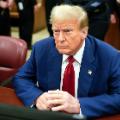As crews in Washington, DC, started dismantling some security fencing within hours of President Joe Biden's inauguration, it remained clear that security in the nation's capital will likely never return to its pre-insurrection form.
It's unclear what security changes, if any, made across Washington in preparation for the inauguration will remain permanent, or to what degree President Joe Biden's upcoming address to a joint session of Congress and potential impeachment proceedings will be considered in security planning.
Sen. Dick Durbin, an Illinois Democrat, has said the US Capitol complex "will never be the same."
DC Mayor Muriel Bowser said on Tuesday that there would be a "new posture" in the district, but also noted she didn't want "fences and armed troops in our city any longer than they need to be."
In a tweet Wednesday, the mayor's chief of staff said crews will begin breaking down fencing on major streets in "earnest" starting that evening and the process would take 36 hours. The time frame for removing the fencing was set to coincide with the lifting of the city's pause on an indoor dining ban. The ban is scheduled to end at 5 p.m. ET Friday.
The unprecedented number of soldiers, federal law enforcement officers, police officers and protective infrastructure in the nation's capital for the inauguration was triggered by a rally-turned-riot on Jan. 6. After the rally, thousands of Trump supporters descended on the Capitol with hundreds or more overrunning the Capitol Police officers protecting it, all in an effort to overturn the presidential election results.
More than 20,000 soldiers were deployed to Washington for Biden's inauguration, and more than 6,000 National Guard soldiers will remain beyond that.
A federal official familiar with the National Guard deployments said the current plan is for many guard units depart Thursday. Some more regional ones may stay through the weekend.
"And that number can go up or down depending on the lead federal agency requirements or federal law enforcement requests," said Army Gen. Daniel Hokanson, chief of the National Guard Bureau. "But really after the inauguration, we'll look at the conditions and the environment and the mission set that we're asked to perform. And if that is below the number of personnel that we have, then we'll start identifying those folks to get them home as quickly as possible."
At the Capitol, Durbin predicted there could be metal detectors at entrances to each legislative chamber and some "enhanced" perimeter of the building.
"We're reaching a point where it is — if we have to fear that some members will bring firearms on the floor or visitors will, then we have to take extra precautions," he said.
Durbin said he hasn't spoken to new Senate Majority Leader Chuck Schumer about placing metal detectors in front of the Senate chamber and it would be his decision.
As for now, portions of the District remain largely on lockdown. Four of the bridges inbound to the city are closed until Thursday morning. The National Mall, the city's central park, is closed, covered in flags to represent the American citizens who cannot be there in person due to the security measures and Covid-19 restrictions.
CNN’s Ryan Nobles, Ali Zaslav, Phil Mattingly, Josh Campbell and Aileen Graef contributed to this report.






